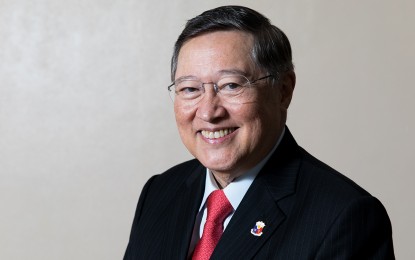
Finance Secretary Carlos Dominguez III (file photo)
MANILA – Finance Secretary Carlos Dominguez III pitched before foreign investors Friday the Philippines’ “game-changing undertakings” to ensure a strong, inclusive, and resilient recovery from the pandemic as he urged them to take part in these initiatives to help achieve a ‘sustainable and better future” for the Filipino people.
These game changers include a fast-tracked digitalization program across the Philippine bureaucracy, the timely passage of the corporate tax reform law, the establishment of a national identification system, measures to improve the ease of doing business, the sustained modernization of the country’s infrastructure, and ambitious climate adaptation and mitigation projects, he said.
Dominguez said investment partnerships with foreign investors can be strengthened in the areas of infrastructure development, manufacturing, digital technology, renewable energy (RE) and research and development (R&D) activities.
“This is a good time to expand collaborations. Our countries are emerging from the pandemic, led by the adept public policy and strong private sector initiatives,” he said in a virtual Philippine Economic Briefing (PEB) with the different foreign chambers in the country.
Dominguez also reaffirmed the Philippines’ rosy post-pandemic economic outlook in his pre-recorded message aired during the 10th anniversary celebration of the Italian Chamber of Commerce in the Philippines Inc. (ICCPI).
“The Philippines is a vibrant market once again. We are determined to return to the pattern of rapid growth momentarily interrupted by the pandemic. We are more than ready for the new and better normal,” he said.
With coronavirus disease 2019 (Covid-19) infections declining at a steady rate owing to the Philippines’ scaled-up vaccination drive, he reiterated the economic team’s earlier assessment of achieving a full reopening of the economy by the onset of the New Year.
Dominguez said he expects the 7.1-percent growth of the economy in the third quarter, along with the increase in foreign direct investments (FDIs), sound financial position, and continuing fiscal discipline to further lead to a better gross domestic product (GDP) performance in the fourth quarter.
In calling on the foreign chambers to help spread the word and encourage more investors “to be involved in (the Philippines’) game-changing undertakings” Dominguez cited the government’s measures to transition to a digital economy.
These include the use of electronic channels by the main revenue-generating agencies to enable them to overshoot their collection targets, and the migration of transactions online to develop broad-based and inclusive capital markets, such as those initiated by the Securities and Exchange Commission (SEC) and the Bureau of the Treasury (BTr).
Dominguez also underscored the timely passage of the Corporate Recovery and Tax Incentives for Enterprises Act (CREATE) that offered businesses the biggest stimulus package ever to help them recover from the pandemic; and modernized the fiscal incentives system to encourage more high-value investments and innovation.
He said CREATE complements the other reform efforts initiated by the Duterte administration to make the Philippines more business friendly.
These include the Anti Red-Tape Act (ARTA), the Ease of Doing Business (EODB) Act, the infrastructure modernization program, and the establishment of a national ID system, among other measures.
Signed into law by President Rodrigo R. Duterte in August 2018, Republic Act 11055, or the Philippine Identification System Act, aims to establish a single national ID for all Filipinos and resident aliens.
The national ID shall be a valid proof of identity that shall be a means of simplifying public and private transactions, enrollment in schools, and the opening of bank accounts.
It also seeks to boost efficiency, especially in dealing with government services where people will only need to present one ID during transactions. (PR)
